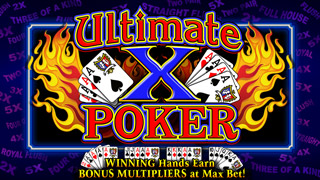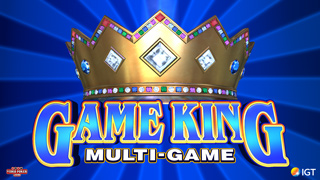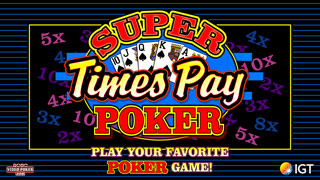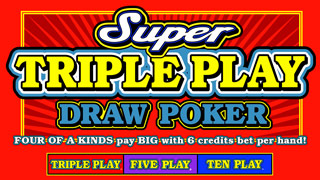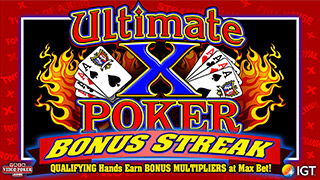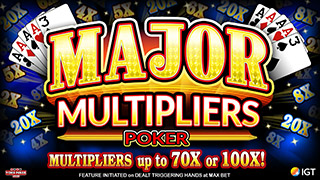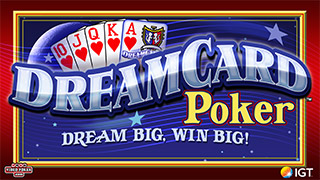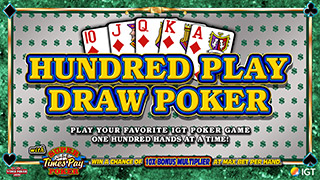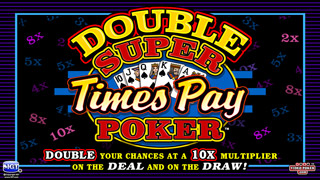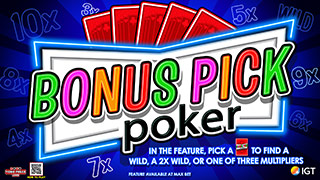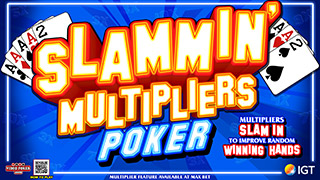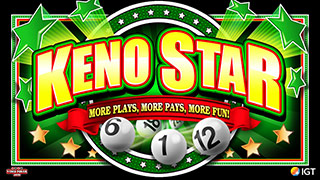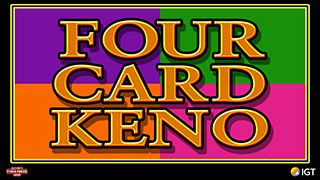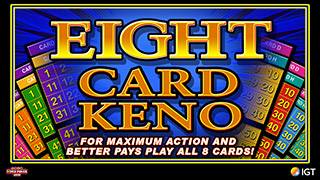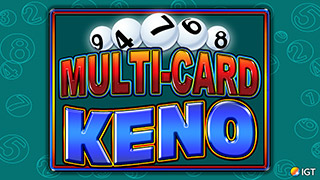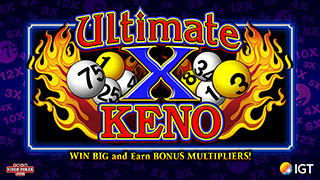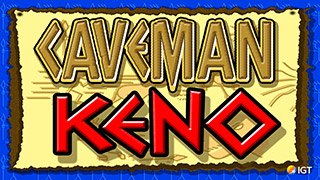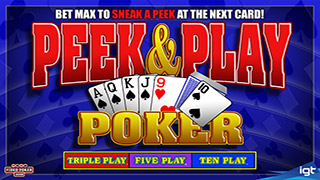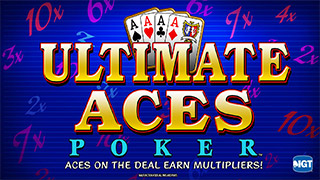Expected Loss for DDB
-
ko king
- VP Veteran
- Posts: 670
- Joined: Fri Feb 17, 2012 10:13 pm
Expected Loss for DDB
While I understand there is no exact answer to my question I am just checking to make sure an answer I gave to someone is right. If someone plays 150K hands of $1 denomination DDB video poker at max play with a 9/6/4 pay table they should expect to lose $7,650.00 on average. If someone plays 150K hands of $1 denomination DDB video poker at max play with a 9/5 paytable they should expect to lose $15,975.00 on average. I ask because we were arguing about which casino in our area was better to play at, I used the figures for the amount of hands played based on how much I play. It's a no brainer of corse to play at the casino with the better paytables but they were arguing about my estimate for expected losses. Am I right or wrong?
-
New2vp
- Video Poker Master
- Posts: 1881
- Joined: Mon Sep 11, 2006 4:02 am
While I understand there is no exact answer to my question I am just checking to make sure an answer I gave to someone is right. If someone plays 150K hands of $1 denomination DDB video poker at max play with a 9/6/4 pay table they should expect to lose $7,650.00 on average. If someone plays 150K hands of $1 denomination DDB video poker at max play with a 9/5 paytable they should expect to lose $15,975.00 on average. I ask because we were arguing about which casino in our area was better to play at, I used the figures for the amount of hands played based on how much I play. It's a no brainer of corse to play at the casino with the better paytables but they were arguing about my estimate for expected losses. Am I right or wrong?Notwithstanding the possible contradiction in your first sentence, I would say that your answer is largely correct. (If there were no exact answer, it would seem to be difficult to determine if any answer was in fact the right one, so I'm guessing that you might have meant something different.)With computer perfect play, the expected loss on 9/6 DDB is $7644.12, to the 2-decimal precision that you posted; and, with the same caveats the expected loss on 9/5 DDB is $15,952.97. (Certainly the actual gain or loss would be in increments of $5, as your figures were; however, the expected value is the average of all possible results and would generally not be in those increments.)
-
Frank Kneeland
- VP Veteran
- Posts: 762
- Joined: Wed Feb 02, 2011 6:59 pm
The way you set up your question by stating that you realized there is no "exact answer" implies that you understand the difference between expectation and actualization. There is indeed no way to know for sure how you WILL do. That being said, it is perfectly possible to predict how you SHOULD do, and you have done this just fine.The whole will/should thing is a major disconnect for most folks and there appears to be more people on the side of misunderstanding than there is on the side of comprehension. Not necessarily for you, but for the peanut gallery, I'd like to state a few things about expectation that might help:1. A stated expected return is essentially the exact mid point of a bell curve on which the left side would represent doing worse and the right side would represent doing better. It really isn't a single number but a representation of a spectrum of possible results, the average of which is the stated expectancy.2. While being the most probably outcome, the stated expectancy is also the least likely, because it has to be taken in context of ALL the possible outcomes, of which it is but one.3. Your chances of being above or below the stated expectancy is roughly 50/50. Flip a coin; heads you'll do worse, tails you'll do better.4. How much better and how much worse is a function of game variance AND return.5. If we take your above examples it is very likely that you'll have those listed returns + or - about $15,000. On the one game the + or - error rate of 1 standard deviation would make you ahead. On the 9/5 game a single standard deviation to the positive would not be enough to overcome the base return of the game and make you ahead.6. And lastly, expectation is used for decision making in advance of playing and irrespective of results. How you end up doing has no impact on, nor does it effect how you should have done. The two are unrelated concepts. Since expectation includes all the things that can happen, whatever does end up happening will not validate or invalidate the calculation. If we know that the chances of being struck by lighting are 1 in 3 million, that doesn't change in the event that you are struck. We still have to look at all the people on the planet, not just you.~FK
-
backsider
- VP Veteran
- Posts: 578
- Joined: Sun May 08, 2011 11:35 pm
I think the most important part of your explanation is how you never can really know how youll end up on any game before you play it. Those two games the op mentioned have minutely different pay tables, but even though its ever-so-slightly expected to do better on one than the other, that doesnt mean peanuts. The 9/5 player can win after 1000 or 10000 or 150000 hands while the hotshot who thinks hes going to do better on 9/6 gets wiped out throughout the range. For a player such as myself, who is more like most players, we count on being at the right place at the right time like I was last week. A few extra credits for a fullhouse sounds good, but at the end of the day what does it truly mean and how important was it? For me, it means squat. The best part is I never overlose because of it, I never overwin because of it, and Im as happy as a lark when I play because Im no worry wart about these little things.
-
Frank Kneeland
- VP Veteran
- Posts: 762
- Joined: Wed Feb 02, 2011 6:59 pm
I think the most important part of your explanation is how you never can really know how youll end up on any game before you play it. Those two games the op mentioned have minutely different pay tables, but even though its ever-so-slightly expected to do better on one than the other, that doesnt mean peanuts. The 9/5 player can win after 1000 or 10000 or 150000 hands while the hotshot who thinks hes going to do better on 9/6 gets wiped out throughout the range. For a player such as myself, who is more like most players, we count on being at the right place at the right time like I was last week. A few extra credits for a fullhouse sounds good, but at the end of the day what does it truly mean and how important was it? For me, it means squat. The best part is I never overlose because of it, I never overwin because of it, and Im as happy as a lark when I play because Im no worry wart about these little things.
It's not that slight Backsider. The 9/5 player is more than 90% likely to lose more than the 9/6 player over the course of 150,000 hands. That's 9 out of 10 times they'll do worse. Over the course of a day the 9/5 player is losing about $320 more than the 9/6 player with all hands being equal. I would call that a huge difference, not a minor one.That's triple the average daily income of an American. I don't know how you can say that doesn't mean squat.
-
Frank Kneeland
- VP Veteran
- Posts: 762
- Joined: Wed Feb 02, 2011 6:59 pm
A bit more on the subject broken
down. I think the most important part of
your explanation is how you never can really know how you'll end up
on any game before you play it.
True, but you focused on the wrong part
of what I said. Though one cannot know HOW they will do, they can
know how the SHOULD do. When you truly get this and what it means you
will be able snatch the pebble from my hand grasshopper.
Those two games the op mentioned have
minutely different pay tables, but even though its ever-so-slightly
expected to do better on one than the other, that doesn't mean
peanuts.
There is nothing minute or slight about
being paid 1 less for the Full Houses. A Full House occurs, on
average, once every 92 hands, which at a pace of 800 hands an hour
would be 8.7 per hour. This translates to $43.47 an hour...which
would be $347.83 a day, if one played an eight hour shift. If three
hundred and fifty bucks a day is your idea of slight, I want your
job.
The 9/5 player can win after 1000 or
10000 or 150000 hands while the hotshot who thinks he's going to do
better on 9/6 gets wiped out throughout the range.
OK focus! You are comparing a
hypothetical person playing 9/5 that does well, with a hypothetical
person playing 9/6 that did poorly. That would be like matching up
two gun fighters for a dual, one with real bullets, the other with
blanks and being surprised at the outcome. To fairly compare 9/6 with
9/5 play, you have to assume that each player gets the same hands.
If we assume each player gets exactly
the same hands over the course of their play, then the 9/6 player
WILL always do better, assuming even one Full House is hit during
play.
What you seem to be missing is that
getting less for a common hand like the Full House effects you even
in the event of a large win. Imagine these results based on the
average loss for DDB in an eight hour session:
9/5 DDB on a day without a Royal =
-$1,154.00
9/6 DDB on a day without a Royal
= -$834.00
9/5 DDB on a day with a Royal =
+$2,846.00
9/6 DDB on a day with a Royal =
+$3,166.00
In these examples the 1 pay difference
on the FH wasn't enough to change a win into a loss or a loss into a win, it
simply made the loss larger and the win greater.
One could also easily imagine days
where the $350 dollar difference could be the difference between
winning and losing. The point is, if you are going to compare 9/5 to
9/6 you have to compare them with a level playing field. You can't
say, “if I get lucky I could do better on the 9/5 than getting
unlucky on the 9/6”. You have to compare getting lucky on both, or
getting unlucky on both. If you make a fair comparison the one that
pays more for certain hands is always better. It's the simplest of
math, 6 > 5.
For a player such as myself, who is
more like most players, we count on being at the right place at the
right time like I was last week. A few extra credits for a full-house
sounds good, but at the end of the day what does it truly mean and
how important was it?
Being in the right place at the right
time and being in the wrong place at the wrong time are all things
that happen in equal proportion to all players, whether or not they
play 9/6 or 9/5 machines. The 9/6 player will simply get $5 dollars
more each and every time they hit a Full House. It adds up so fast it
makes your head spin if you start counting.
For me, it means squat.
The best part is I never ever lose because of it, I never ever win
because of it, and I'm as happy as a lark when I play because I'm no
worry wart about these little things.
What I hear you saying is that you
think it means squat, and you are protecting this point of
view by not counting your Full Houses and ignoring all
disconfirmatory evidence. Well I'm sorry, it makes a HUGE difference
and if you started keeping accurate records you'd see this. Don't
believe me, just start counting all your Full Houses. Seriously,
don't believe me and start counting. You're not going to like what
you find. Hundreds of dollars a day!
You may well be ahead during your
recent play. I'm not disputing that.
Now consider this, you'd be more
ahead if you'd gotten exactly the same hands on a game where the FH
paid one more.
I'm really sorry I had to be more
confrontational than normal, but convincing people that the pay-table
doesn't matter could really hurt and confuse a lot of people. You're
still my favorite muse. ~FK
-
gofaster87
- Forum Rookie
- Posts: 31
- Joined: Sun Jan 03, 2010 8:39 pm
I feel your pain Frank. Ive had to explain these differences to several people I know especially with Deuces(paying 5-1 instead or 4-1) and DB. Think of it this way, on deuces, a 4oak occurs a little over every 15 hands. I average 1000+ hands/per hour. I would be giving up over 300 credits on 60+ hands/hour on the inferior pay schedule. I cringe when I see people play 9/6/4 DB or 8/5 DDB and think its no big deal. Ive kept count before and Ill tell everyone it makes a huge difference after a 5 hour session.
-
backsider
- VP Veteran
- Posts: 578
- Joined: Sun May 08, 2011 11:35 pm
This looks like my math teacher from college talking theory to me instead of how things really are out in the world we all live in. I recently played a poor pay table when I was dealt the $20000 royal on $1 fiveplay. Going in it made no difference to me what the fh paid because I consider myself lucky to get them when I do, and I dont look at hitting them as "losing 5 credits" or whatever crazy explanation Ive read from the experts in the past. All the analysis in the world means peepee when you pick a game to play because you have no idea what will happen or even what SHOULD happen, because we are not clairvoyants. All we can hope for is for luck to shine upon us while we are there, and then for us to have the strength to get up and walk out (or in my case, roll out). People who have fits over the pay tables dont do any better than those of us who dont really give a hoot about them. No one can prove otherwise. All they can do is quote theory when they know as well as I do that the extra credits won from the better paying fhs will be squandered away anyway by almost everyone before they finally get up to leave. People say Im stupid for playing that poor pay table the other night. Ill be happy to loan them some money or to bankroll Frank to play on my progressive team if that ever happens. I love sharing.
-
Frank Kneeland
- VP Veteran
- Posts: 762
- Joined: Wed Feb 02, 2011 6:59 pm
Comments Below
This looks like my
math teacher from college talking theory to me instead of how things
really are out in the world we all live in.
It's odd that you are perceiving the
information that way because I am talking about how it is out there
in the real world, whereas you are talking theory. I even asked you
to count your Full Houses in the real world, which would be about as
far from theory as you can get.
I recently played a poor pay table when
I was dealt the $20000 royal on $1 five-play.
And what you seem to be missing is that
Royals are just as easy to hit on good pay-tables. Had you played a
better pay table you'd still have gotten your Royal and you would
have gotten more for the lesser hands AS WELL. I assume you were
playing $5 token. I don't know how long you played, but had you
played 8 hours on a better pay-table (1 more on FH) you'd have
exactly the money you have now + $1,750.
Going in it made no difference to me
what the FH paid because I consider myself lucky to get them when I
do, and I don't look at hitting them as "losing 5 credits"
or whatever crazy explanation Ive read from the experts in the
past.
What you have here is a textbook case of Informational bias (including irrelevant information in a decision making process) and Attentional Bias (not including relevant information in a decision making process). Here the irrelevant information was how you did, because that information was not available when the decision was made. You said it yourself, no one knows the future, yet you are including the future in your judgments of the past. This is also related to hindsight bias and outcome bias.You
choose a path and you are taking how you did on that path as PROOF it
was the correct choice... but you can't, because you didn't take the
other path. To know for sure that you did BETTER by playing the worse
machine you would have to go back in time and ALSO play the better
machine and then compare results.
The
way you are thinking about your choice can only confirm your
preexisting beliefs and it has no chance of disproving what you
already believe. In science we would say your experimental
methodology lacks falsifiability. It is the criteria for bad science.
What you have is a Russell's teapot.
In
science it's fine to say that there are only white swans, because I
can prove you wrong by presenting a black swan. It isn't fine to say
you did better on the bad pay-table, because you never played the good
pay-table. You cannot know you did better because you only took one
path.http://en.wikipedia.org/wiki/Informatio ... _teapotTry to think about this logically: You are comparing how you did on a machine you played, to how you didn't do on a machine you never played. If we put this logic into an equation it would look like this:How I did is > than how I didn't do. (This is of course impossible)
All the analysis in the world means
peepee when you pick a game to play because you have no idea what
will happen or even what SHOULD happen, because we are not
clairvoyants.
It funny but that's my
point as well. No analysis is required to know that getting 6 times
your bet for the Full House is better than getting 5. And since we
aren't clairvoyant and can't predict the future we should always make
the best choices we can with the information available at the time.
You didn't know how you were going to do before you played, yet
you are including how you did in an assessment of your decision to
play the lower return game that was made in advance of knowing your
results. The scary thing is you
seem to be oblivious to the fact you are doing this or even that it
is a problem.
You
seem to have outcome and hindsight bias to a degree I've never
encountered before. Please note: I did say, “seem”. It's
impossible to judge with any confidence a person from only forum
posts. To know for sure would require extensive testing in person.
All we can hope for is for luck to
shine upon us while we are there, and then for us to have the
strength to get up and walk out (or in my case, roll out).
I've been playing VP for 24 years and
if “luck” exists I've never seen it. All I've seen is probability
math preforming exactly as predicted. It even predicts that some
people playing bad pay-tables will win now and then.
People who have fits over the pay
tables don't do any better than those of us who don't really give a
hoot about them. No one can prove otherwise. All they can do is quote
theory when they know as well as I do that the extra credits won from
the better paying fhs will be squandered away anyway by almost
everyone before they finally get up to leave.
Of course people playing better
paytables can prove it and so could you if you hadn't already made up
your mind... and of course people playing better pay tables do
better. All you have to do is look at the drop for banks of VP
machines with different pay-tables, and yes I've seen them. What I
hear you saying is, “No one can prove it to you, because you
won't believe them if they tell you”. Well
I can't help you there. If you have decided to believe that it
doesn't matter what the pay-table is and assume everyone that tells
you different is lying, you are correct. There is no way to prove it
to you.
Try
counting ALL your Full Houses in the future and keeping a tally.
Hopefully you'll believe your own results.
People say I'm stupid for playing that
poor pay table the other night. Ill be happy to loan them some money
or to bankroll Frank to play on my progressive team if that ever
happens.
I never said you were stupid, nor would
I. As I have said before, research suggests that people with higher
creativity and intelligence are more susceptible to the cognitive
biases and perceptual distortions that give rise the type of thinking
you seem to have, which is broadly categorized as a type I error. It
has nothing to do with being stupid or smart.
Example:
85% of Isaac Newton's work was never
published because of Type I error related flaws. If you studied him
in school what you saw was the edited and sanitized version of his
work published mostly after his death. You didn't get to hear his
thoughts on Alchemy, dream significance, the Protestant Reformation
and Nun torture.
I love sharing.
We can tell...and it's very helpful to discuss such things in public forum, because they are very common and potentially helpful to a great many people. I would add one more thing: Though I don't discuss my results or the results of the team during my tenure as manager, I certainly have had results and access to far more actual results of real people playing real machines than any other video poker player you are ever likely to talk to. The big team had a roster of 68 players. Nothing I'm saying is theory. I'm talking from 24 years of real experience and a sample size of results well over 50 million hands played.If you think I'm talking hypothetically or in theory something is terribly wrong.
-
New2vp
- Video Poker Master
- Posts: 1881
- Joined: Mon Sep 11, 2006 4:02 am
The way you set up your question by stating that you realized there is
no "exact answer" implies that you understand the difference between
expectation and actualization. There is indeed no way to know for sure
how you WILL do. That being said, it is perfectly possible to predict
how you SHOULD do, and you have done this just fine.The whole will/should
thing is a major disconnect for most folks and there appears to be more
people on the side of misunderstanding than there is on the side of
comprehension. Not necessarily for you, but for the peanut gallery, I'd
like to state a few things about expectation that might help:Frank, while I agree that it is difficult for many to separate what is expected before a decision to play is made from what eventually will actually happen when the play has been made, a number of the things that you posted may be misleading to some extent. I'm sure you know most of this stuff; perhaps some of it might be due to simple carelessness or lack of proofreading.For additional explanation, I have posted a chart below that I developed in answering a question in another thread, DW44 Bankroll Requirements. The chart shows the distribution of possibilities for coins won or coins lost after playing 700 hands of 15/11 Almost Positive Deuces, a 99.96% game that is essentially breakeven.The Pink curve shows the relative likelihood of the various possibilities, with a higher point on the curve indicating that such a possibility is more likely to occur while a lower point on the curve indicates that the possibility is less likely to occur. Any points on the curve that are virtually indistinguishable from the horizontal axis (the line at the bottom of the chart) have only an extremely remote chance of occurring. The Blue curve shows what the relative likelihoods would be if the distribution ACTUALLY was a normal bell-shaped curve with the same expected value and variance as the video poker distribution.It seems to me that even some highly-educated math-savvy video poker players are not actually aware of the differences between the two curves and what they represent.I apologize in advance for using your post to illustrate the differences between the actual distribution and the estimated normal distribution that some use for explanation, but it looks like this could be a fairly teachable moment using a phrase that is sometimes misused by one of your students.1. A stated expected return is essentially the exact mid point of a bell curve on which the left side would represent doing worse and the right side would represent doing better.No, a videopoker distribution is generally NOT a symmetric bell curve (until you play around a million dealt hands), so the expected value cannot be at the exact mid point of a bell curve. The expected return is generally to the right of what is seen as the top of the curve; in the illustration below, it is approximately -1.5 coins, which is really close to the vertical line going through the graph at the zero label.Video poker distributions are generally severely skewed to the right, meaning that the left tail is shorter than the normal distribution and the right tail is considerably longer. This is evidenced by the limited though frequent losses when you play (you cannot lose more than you bet) vs. the large but infrequent jackpots that are available.There are several consequences of this. One is that the expected value is generally to the right of the peak of the distribution. Since this game is almost breakeven, you can't really tell the difference between the normal distribution's peak and a gain/(loss) of zero; but the peak of the video poker distribution is clearly to the left of expected return, in loss territory.A video poker distribution is NOT symmetric, unlike what you see with a normal, bell-shaped distribution. And the normal distribution probabilities (68.27% within one standard deviation, 15.866% in both right and left tails; 95.45% within two standard deviations, 2.275% in both tails; 99.73% within three standard deviations, 0.135% in both tails; etc.) DO NOT APPLY. Generally, there is considerably less chance of being in the left tail, meaning fewer large losses than are predicted by the normal distribution; and, there is considerably more chance of being in the right tail, meaning more large gains than are predicted by the normal distribution.It really
isn't a single number but a representation of a spectrum of possible
results, the average of which is the stated expectancy.No, expected return is actually a single number. In the illustration below, that number is approximately 99.96% of the amount bet. The spectrum of possible results, along with their probabilities colloquially make up the distribution (or sometimes density or probability mass function).2. While being the most probably outcome, the stated expectancy is also the least likely, because it has to be taken in context of ALL the possible outcomes, of which it is but one.This statement is fairly strange, but wrong on more than one count. The most probable outcome could NOT also be the least likely outcome. The least likely outcome in this case would be either an outcome that is impossible (like a loss of more than you bet, or a gain of more than 3995 x 700 coins) with a probability of zero; or, if we are going to consider only outcomes that are possible no matter how remote, the least likely outcome would be the gain associated with 700 consecutive royal flushes.However, we cannot give partial credit to this answer, because the expected value is not even at the highest point on the pink curve, so we cannot consider it to be most likely in any sense. The most likely outcome is a loss of 220 coins, which would be an actual return of around 93.71%, quite a bit below the expected return of 99.96%. 3. Your chances of being above or below the stated expectancy is roughly 50/50. Flip a coin; heads you'll do worse, tails you'll do better.No, a video poker distribution is not symmetric. Perhaps after a million dealt hands or so, it will be close to symmetric. But even for monthly results for most, the chances will not be 50/50. You often hear video poker experts say that they have about two losing sessions for every winning session, even when playing positive games. Of course, the average win is larger than the average loss, which is common with a distribution that is skewed to the right. In this example, the probability of a win is 32.26%, the probability of a loss is 67.26%, with a probability of 0.48% remaining to be exactly breakeven, about a 207 to 1 shot.4. How much better and how much worse is a function of game variance AND return.Well, the probability of being above or below expected return are of course based on the pay schedule, but I think you would have difficulty linking that probability if I only told you the variance and return. They are not sufficient to determining the probability of either making a profit or of beating expected return. For example, if you play 1000 hands of 9-6 Jacks or Better (99.54% ER, Variance 19.51), you have a 34.57% chance of making a profit; with 9-7 Double Bonus (99.11% ER, Variance 28.55), you have a 38.44% chance; with 9-6 DDB (98.98% ER, Variance 41.99), you have a 35.52% chance. Ok, I just gave you probabilities of winning, not of beating expected return. So, let's see what happens if we give each of these games a royal flush jackpot that gets their expected return to exactly 100.00% (or as near without going under as VPFW allows since it has a glitch that requires all payoffs to be multiples of 5). That would be royal flush payoffs of 4880 for Jacks, 5765 for DB, and 5850 for DDB. Now, the numbers are probabilities of being a profit (above ER) are fairly close to what I gave before: 9-6 Jacks or Better 100.00% ER, Variance 30.16), you have a 33.23%
chance of making a profit; with 9-7 Double Bonus (100.00% ER, Variance 52.84 ), you have a 36.94% chance; with 9-6 DDB (100.00% ER, Variance 65.66), you have a 34.95% chance, all a bit lower. There still is no clear pattern based on ER or variance. If you stay in the same game family, your chances of being ahead probably increase if you increase the payoff for a flush or full house, but probably decrease if you increase the payoff for a full house. So, I think it may be better to say the probability of profit or of beating expected value varies based on each individual game and must be analyzed individually.5. If we take your above examples it is very likely that you'll have those listed returns + or - about $15,000. On the one game the + or - error rate of 1 standard deviation would make you ahead. On the 9/5 game a single standard deviation to the positive would not be enough to overcome the base return of the game and make you ahead.6. And lastly, expectation is used for decision making in advance of playing and irrespective of results. How you end up doing has no impact on, nor does it effect how you should have done. The two are unrelated concepts. Since expectation includes all the things that can happen, whatever does end up happening will not validate or invalidate the calculation. If we know that the chances of being struck by lighting are 1 in 3 million, that doesn't change in the event that you are struck. We still have to look at all the people on the planet, not just you.As a final note, I love these last two points. I might not go so far as to call the concepts totally unrelated, but poetic license in making the point certainly seems reasonable and in most cases the relationship is weak. It is interesting that even with the issues raised, I still support your conclusions. Hopefully this adds rather than detracts from the discussion.Oh, and by the way, please pardon my amusement that throughout your discussion elsewhere in this thread, both you and your antagonist are mulling over the relative importance of payoffs for FULL HOUSES when the difference between the pay schedules being discussed are actually for FLUSHES. Of course, this makes your points stronger since there are actually going to be more flushes achieved in extended play than full houses.It is also somewhat humorously ironic that you consider the obdurateness of your cohort to be due simply to a condition that causes him to "ignor[e] all
disconfirmatory evidence." (I have to be careful here; I sometimes get confused between the words "obdurateness" and "obtuseness.") I wonder what would allow one not to recognize that getting 30 coins is in fact better than getting 25 coins, especially when one considers that with TITO there is no additional weight in the winnings. I must admit that I cannot come up with any logical conclusion along those lines. It is a bit like the Capital One commercial where Jimmy Fallon is interviewing the baby, the one holdout in the survey who does NOT prefer to have more cash. My recommendation would be to go the other way; tell your buddy that he should really try to seek out machines that were 8/5 (or even 7/5) instead of 9/5. If he likes the reduction in payoffs for a flush, he should really go bananas over a single or double coin reduction in full houses.I think you might want to consider that it is not beyond the realm of possibility that there could be more than one person here being guilty of disregarding "disconfimatory" evidence. There may be more informational support here that someone is not being sincere and just continuing to pull your chain, simply to get attention than there is for the fact that a grown adult actually believes that getting a multiple of six is worse than getting a multiple of five.



